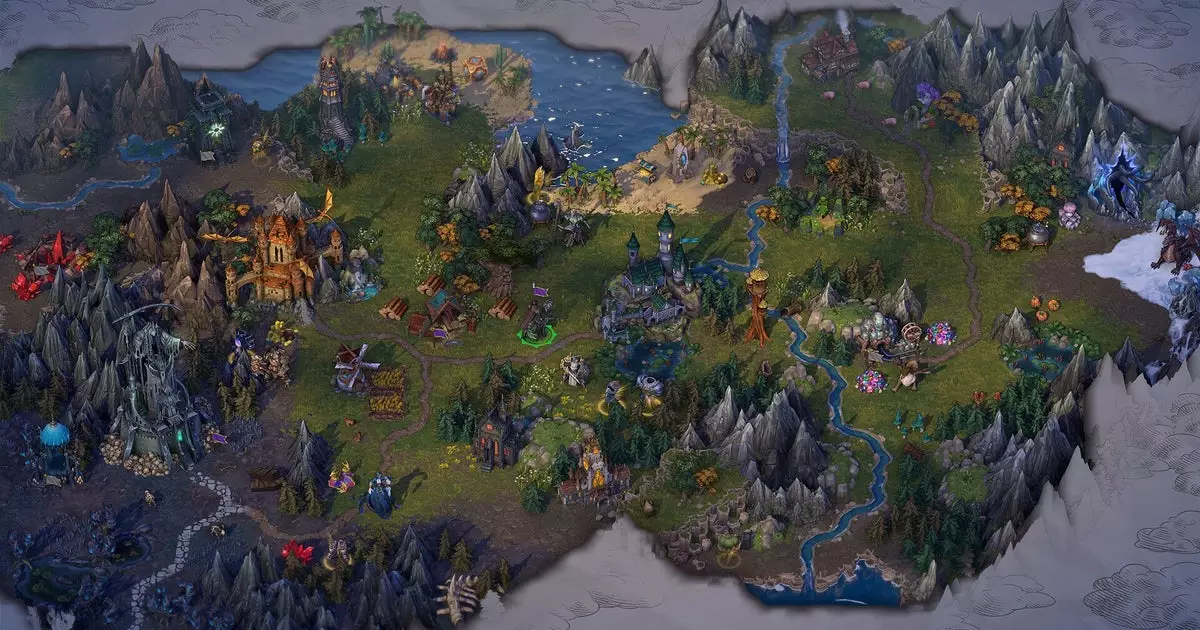In the ever-evolving landscape of the gaming industry, where giants often cling to control and traditional publishing routes, Ubisoft’s decision to entrust the marketing and distribution of Heroes of Might and Magic: Olden Era to Hooded Horse marks a significant departure from convention. This move reveals a strategic pivot that hints at a broader industry trend: leveraging specialist publishers to breathe new life into classic franchises. Instead of exclusively managing the publishing process internally, Ubisoft has opted for collaboration, signaling a possible shift in how established franchises are revitalized in today’s competitive market.
This decision could be interpreted as an acknowledgment of the specialized expertise that niche publishers offer. Hooded Horse, with their portfolio of strategy titles like Manor Lords and Norland, demonstrates a deep-rooted understanding of the strategy community’s expectations. Their involvement is likely aimed at ensuring that Heroes Of Might And Magic: Olden Era reaches its target audience more effectively, especially in regions or demographics that Ubisoft’s traditional channels might not penetrate as efficiently. This strategic partnership is less about relinquishing control and more about maximizing potential — a smart move in an industry where reach, visibility, and community engagement can make or break a game’s success.
Deciphering Ubisoft’s Hidden Agenda: Cost, Focus, or Strategy?
The rationale behind such a decision is multifaceted, but it’s difficult not to suspect economic motivations at play. Ubisoft, like many large publishers lately, is undergoing internal restructuring, streamlining operations, and perhaps most notably, trying to optimize costs. Their recent split into separate entities, consolidating major franchises under specific umbrellas, indicates a desire to focus on flagship titles while divesting other properties, possibly to reduce overhead or redirect funds into more promising ventures.
Assigning the publishing responsibilities of a beloved franchise like Heroes of Might and Magic to a smaller, dedicated publisher could free up internal resources, allowing Ubisoft to concentrate on their core or newly prioritized projects. Moreover, this move might be intended to foster a perception of revitalization for the franchise without the heavy burden of full control. By partnering with Hooded Horse, Ubisoft can continue to support the game “where needed,” while avoiding the potential pitfalls of day-to-day management that might impede development timelines or creative input.
The strategic rationale could also reflect a broader industry trend — third-party publishers often have a sharper focus on niche markets, cultural nuances, and community sentiment. Ubisoft might see value in harnessing Hooded Horse’s expertise to craft a product that resonates strongly within strategy circles, which could lead to better reviews, enhanced community loyalty, and ultimately, higher sales. The increased marketing support that Unfrozen claims to benefit from via this partnership suggests that this approach is aimed at generating buzz and visibility that Ubisoft’s traditional channels might not generate on their own.
The Implications for the Franchise and Industry Dynamics
This move signals a potential shift in how major publishers approach legacy titles. Rather than monopolizing control, they are increasingly adopting a hybrid approach: maintaining ownership of intellectual property while outsourcing the tactical day-to-day publishing to specialists. This can enhance a franchise’s chances of success in a crowded marketplace that demands sharp targeting, community engagement, and region-specific marketing strategies.
For old-school fans, this could be a double-edged sword. On one hand, a specialized publisher might better understand and cater to the genre’s players, delivering a product that feels faithful to the roots of the series. On the other hand, it raises questions about creative independence and long-term franchise management. Will Hooded Horse, with its growing portfolio, be able to uphold the legacy and integrity of such a storied franchise? It’s a gamble, but one that reflects confidence in the publisher’s expertise.
Looking forward, this method could serve as a template for how legacy franchises are managed in the future — a blend of internal ownership with external tacticians, allowing big publishers to navigate financial realities while still honoring long-standing fanbases. Ubisoft’s approach demonstrates a willingness to adapt, perhaps realizing that in the modern era, collaboration and specialization are the keys to reinvigorating aging IPs and capturing new audiences.
Ultimately, Heroes of Might and Magic: Olden Era stands at a crossroads of tradition and innovation, with its fate intertwined with strategic partnerships. How successful this venture becomes may very well shape the way publishers think about legacy titles in the digital age, blending corporate oversight with niche market insight to craft gaming experiences that honor the past while embracing the future.

